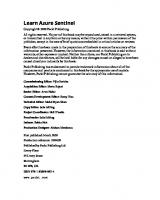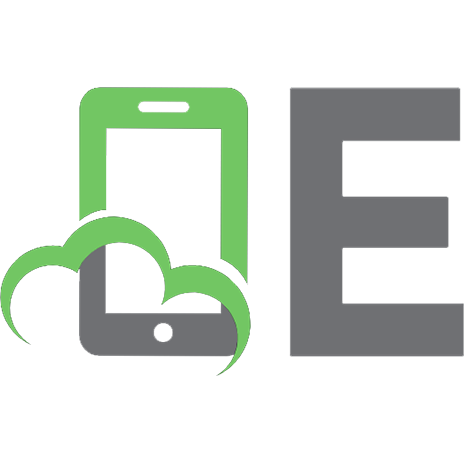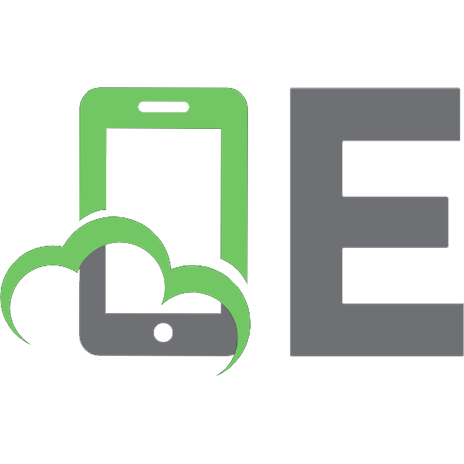Learn Azure Sentinel: Integrate Azure security with artificial intelligence to build secure cloud systems 9781838980924
Azure Sentinel is a Security Information and Event Management (SIEM) tool developed by Microsoft to integrate cloud secu
1,969 13 33MB
English Pages 422 Year 2020
Table of contents :
Cover
Copyright
Why subscribe?
Foreword
Contributors
About the authors
About the reviewers
Packt is searching for authors like you
Table Of Contents
Preface
Who this book is for
What this book covers
To get the most out of this book
Download the color images
Conventions used
Get in touch
Reviews
Section 1: Design and Implementation
Chapter 1: Getting Started with Azure Sentinel
The current cloud security landscape
Cloud security reference framework
SOC platform components
Mapping the SOC architecture
Log management and data sources
Operations platforms
Threat intelligence and threat hunting
SOC mapping summary
Security solution integrations
Cloud platform integrations
Integrating with AWS
Integrating with Google Cloud Platform (GCP)
Integrating with Microsoft Azure
Private infrastructure integrations
Service pricing for Azure Sentinel
Scenario mapping
Step 1 – Define the new scenarios
Step 2 – Explain the purpose
Step 3 – The kill-chain stage
Step 4 – Which solution will do detection?
Step 5 – What actions will occur instantly?
Step 6 – Severity and output
Step 7 – What action should the analyst take?
Summary
Questions
Further reading
Chapter 2: Azure Monitor – Log Analytics
Technical requirements
Introduction to Azure Monitor Log Analytics
Planning a workspace
Creating a workspace using the portal
Creating a workspace using PowerShell or the CLI
Exploring the Overview page
Managing the permissions of the workspace
Enabling Azure Sentinel
Exploring the Azure Sentinel Overview page
The header bar
The summary bar
The Events and alerts over time section
The Recent incidents section
The Data source anomalies section
The Potential malicious events section
The Democratize ML for your SecOps section
Connecting your first data source
Obtaining information from Azure virtual machines
Advanced settings for Log Analytics
Connected Sources
The Data option
Computer Groups
Summary
Questions
Further reading
Section 2: Data Connectors, Management, and Queries
Chapter 3: Managing and Collecting Data
Choosing data that matters
Understanding connectors
Native connections – service to service
Direct connections – service to service
API connections
Agent-based
Configuring Azure Sentinel connectors
Configuring Log Analytics storage options
Calculating the cost of data ingestion and retention
Reviewing alternative storage options
Questions
Further reading
Chapter 4: Integrating Threat Intelligence
Introduction to TI
Understanding STIX and TAXII
Choosing the right intel feeds for your needs
Implementing TI connectors
Enabling the data connector
Registering an app in Azure AD
Configuring the MineMeld threat intelligence feed
Confirming the data is being ingested for use by Azure Sentinel
Summary
Questions
Further reading
Chapter 5: Using the Kusto Query Language (KQL)
Running KQL queries
Introduction to KQL commands
Tabular operators
Query statement
Scalar functions
String operators
Summary
Questions
Further reading
Chapter 6: Azure Sentinel Logs and Writing Queries
An introduction to the Azure Sentinel Logs page
Navigating through the Logs page
The page header
The Tables pane
The Filter pane
The KQL code window
The results window
Learn more
Writing a query
The billable data ingested
Map view of logins
Other useful logs
Summary
Questions
Further reading
Section 3: Security Threat Hunting
Chapter 7: Creating Analytic Rules
An introduction to Azure Sentinel Analytics
Types of analytic rules
Navigating through the Analytics home page
Creating a rule from a rule template
Creating a new rule using the wizard
Managing analytic rules
Summary
Questions
Chapter 8: Introducing Workbooks
An overview of the Workbooks page
The workbook header
The Templates view
Workbook detail view
Missing required data types
Workbook detail view (continued)
Saved template buttons
Walking through an existing workbook
Creating workbooks
Creating a workbook using a template
Creating a new workbook from scratch
Editing a workbook
Advanced editing
Managing workbooks
Workbook step types
Text
Query
Metric
Parameters
Links/tabs
Advanced settings
Summary
Questions
Further reading
Chapter 9: Incident Management
Using the Azure Sentinel Incidents page
The header bar
The summary bar
The search and filtering section
Incident listing
Incident details pane
Using the Actions button
Exploring the full details page
The Alerts tab
The Bookmarks tab
The Entities tab
The Comments tab
Investigating an incident
Showing related alerts
The Timeline button
The Info button
The Entities button
The Help button
Questions
Further reading
Chapter 10: Threat Hunting in Azure Sentinel
Introducing the Azure Sentinel Hunting page
The header bar
The summary bar
The hunting queries list
Hunting query details pane
Working with Azure Sentinel Hunting queries
Adding a new query
Editing a query
Cloning a query
Deleting a query
Working with Livestream
Working with bookmarks
Creating a bookmark
Viewing bookmarks
Associating a bookmark with an incident
Using Azure Sentinel Notebooks
The header bar
The summary bar
The notebook details pane
Performing a hunt
Develop premise
Determine data
Plan hunt
Execute investigation
Respond
Monitor
Improve
Summary
Questions
Further reading
Section 4: Integration and Automation
Chapter 11: Creating Playbooks and Logic Apps
Introduction to Azure Sentinel playbooks
Playbook pricing
Overview of the Azure Sentinel connector
Exploring the Playbooks page
The header bar
The summary bar
Logic app listing
Logic app settings page
The menu bar
The header bar
The essentials section
The summary section
The Runs history section
Creating a new playbook
Using the Logic Apps Designer page
The Logic Apps Designer header bar
The Logic App Designer workflow editor section
Creating a simple Azure Sentinel playbook
Summary
Questions
Further reading
Chapter 12: ServiceNow Integration
Overview of Azure Sentinel alerts
Overview of IT Service Management (ITSM)
Logging in to ServiceNow
Cloning an existing logic app
Modifying the playbook
Additional incident information
Adding dynamic content
Adding an expression
Summary
Questions
Further reading
Section 5: Operational Guidance
Chapter 13:Operational Tasks for Azure Sentinel
Dividing SOC duties
SOC engineers
SOC analysts
Operational tasks for SOC engineers
Daily tasks
Weekly tasks
Ad hoc tasks
Operational tasks for SOC analysts
Daily tasks
Weekly tasks
Monthly tasks
Ad hoc tasks
Summary
Questions
Chapter 14: Constant Learning and Community Contribution
Official resources from Microsoft
Official documentation
Tech community – blogs
Tech community – forum
Feature requests
LinkedIn groups
Other resources
Resources for SOC operations
MITRE ATT&CK® framework
National Institute of Standards for Technology (NIST)
GitHub for Azure Sentinel
GitHub for community contribution
Kusto Query Language (KQL)
Jupyter Notebook
Azure Logic Apps
Summary
Assessments
Chapter 1
Chapter 2
Chapter 3
Chapter 4
Chapter 5
Chapter 6
Chapter 7
Chapter 8
Chapter 9
Chapter 10
Chapter 11
Chapter 12
Chapter 13
Other Books You May Enjoy
Index
Leave a review - let other readers know what you think
Cover
Copyright
Why subscribe?
Foreword
Contributors
About the authors
About the reviewers
Packt is searching for authors like you
Table Of Contents
Preface
Who this book is for
What this book covers
To get the most out of this book
Download the color images
Conventions used
Get in touch
Reviews
Section 1: Design and Implementation
Chapter 1: Getting Started with Azure Sentinel
The current cloud security landscape
Cloud security reference framework
SOC platform components
Mapping the SOC architecture
Log management and data sources
Operations platforms
Threat intelligence and threat hunting
SOC mapping summary
Security solution integrations
Cloud platform integrations
Integrating with AWS
Integrating with Google Cloud Platform (GCP)
Integrating with Microsoft Azure
Private infrastructure integrations
Service pricing for Azure Sentinel
Scenario mapping
Step 1 – Define the new scenarios
Step 2 – Explain the purpose
Step 3 – The kill-chain stage
Step 4 – Which solution will do detection?
Step 5 – What actions will occur instantly?
Step 6 – Severity and output
Step 7 – What action should the analyst take?
Summary
Questions
Further reading
Chapter 2: Azure Monitor – Log Analytics
Technical requirements
Introduction to Azure Monitor Log Analytics
Planning a workspace
Creating a workspace using the portal
Creating a workspace using PowerShell or the CLI
Exploring the Overview page
Managing the permissions of the workspace
Enabling Azure Sentinel
Exploring the Azure Sentinel Overview page
The header bar
The summary bar
The Events and alerts over time section
The Recent incidents section
The Data source anomalies section
The Potential malicious events section
The Democratize ML for your SecOps section
Connecting your first data source
Obtaining information from Azure virtual machines
Advanced settings for Log Analytics
Connected Sources
The Data option
Computer Groups
Summary
Questions
Further reading
Section 2: Data Connectors, Management, and Queries
Chapter 3: Managing and Collecting Data
Choosing data that matters
Understanding connectors
Native connections – service to service
Direct connections – service to service
API connections
Agent-based
Configuring Azure Sentinel connectors
Configuring Log Analytics storage options
Calculating the cost of data ingestion and retention
Reviewing alternative storage options
Questions
Further reading
Chapter 4: Integrating Threat Intelligence
Introduction to TI
Understanding STIX and TAXII
Choosing the right intel feeds for your needs
Implementing TI connectors
Enabling the data connector
Registering an app in Azure AD
Configuring the MineMeld threat intelligence feed
Confirming the data is being ingested for use by Azure Sentinel
Summary
Questions
Further reading
Chapter 5: Using the Kusto Query Language (KQL)
Running KQL queries
Introduction to KQL commands
Tabular operators
Query statement
Scalar functions
String operators
Summary
Questions
Further reading
Chapter 6: Azure Sentinel Logs and Writing Queries
An introduction to the Azure Sentinel Logs page
Navigating through the Logs page
The page header
The Tables pane
The Filter pane
The KQL code window
The results window
Learn more
Writing a query
The billable data ingested
Map view of logins
Other useful logs
Summary
Questions
Further reading
Section 3: Security Threat Hunting
Chapter 7: Creating Analytic Rules
An introduction to Azure Sentinel Analytics
Types of analytic rules
Navigating through the Analytics home page
Creating a rule from a rule template
Creating a new rule using the wizard
Managing analytic rules
Summary
Questions
Chapter 8: Introducing Workbooks
An overview of the Workbooks page
The workbook header
The Templates view
Workbook detail view
Missing required data types
Workbook detail view (continued)
Saved template buttons
Walking through an existing workbook
Creating workbooks
Creating a workbook using a template
Creating a new workbook from scratch
Editing a workbook
Advanced editing
Managing workbooks
Workbook step types
Text
Query
Metric
Parameters
Links/tabs
Advanced settings
Summary
Questions
Further reading
Chapter 9: Incident Management
Using the Azure Sentinel Incidents page
The header bar
The summary bar
The search and filtering section
Incident listing
Incident details pane
Using the Actions button
Exploring the full details page
The Alerts tab
The Bookmarks tab
The Entities tab
The Comments tab
Investigating an incident
Showing related alerts
The Timeline button
The Info button
The Entities button
The Help button
Questions
Further reading
Chapter 10: Threat Hunting in Azure Sentinel
Introducing the Azure Sentinel Hunting page
The header bar
The summary bar
The hunting queries list
Hunting query details pane
Working with Azure Sentinel Hunting queries
Adding a new query
Editing a query
Cloning a query
Deleting a query
Working with Livestream
Working with bookmarks
Creating a bookmark
Viewing bookmarks
Associating a bookmark with an incident
Using Azure Sentinel Notebooks
The header bar
The summary bar
The notebook details pane
Performing a hunt
Develop premise
Determine data
Plan hunt
Execute investigation
Respond
Monitor
Improve
Summary
Questions
Further reading
Section 4: Integration and Automation
Chapter 11: Creating Playbooks and Logic Apps
Introduction to Azure Sentinel playbooks
Playbook pricing
Overview of the Azure Sentinel connector
Exploring the Playbooks page
The header bar
The summary bar
Logic app listing
Logic app settings page
The menu bar
The header bar
The essentials section
The summary section
The Runs history section
Creating a new playbook
Using the Logic Apps Designer page
The Logic Apps Designer header bar
The Logic App Designer workflow editor section
Creating a simple Azure Sentinel playbook
Summary
Questions
Further reading
Chapter 12: ServiceNow Integration
Overview of Azure Sentinel alerts
Overview of IT Service Management (ITSM)
Logging in to ServiceNow
Cloning an existing logic app
Modifying the playbook
Additional incident information
Adding dynamic content
Adding an expression
Summary
Questions
Further reading
Section 5: Operational Guidance
Chapter 13:Operational Tasks for Azure Sentinel
Dividing SOC duties
SOC engineers
SOC analysts
Operational tasks for SOC engineers
Daily tasks
Weekly tasks
Ad hoc tasks
Operational tasks for SOC analysts
Daily tasks
Weekly tasks
Monthly tasks
Ad hoc tasks
Summary
Questions
Chapter 14: Constant Learning and Community Contribution
Official resources from Microsoft
Official documentation
Tech community – blogs
Tech community – forum
Feature requests
LinkedIn groups
Other resources
Resources for SOC operations
MITRE ATT&CK® framework
National Institute of Standards for Technology (NIST)
GitHub for Azure Sentinel
GitHub for community contribution
Kusto Query Language (KQL)
Jupyter Notebook
Azure Logic Apps
Summary
Assessments
Chapter 1
Chapter 2
Chapter 3
Chapter 4
Chapter 5
Chapter 6
Chapter 7
Chapter 8
Chapter 9
Chapter 10
Chapter 11
Chapter 12
Chapter 13
Other Books You May Enjoy
Index
Leave a review - let other readers know what you think

- Author / Uploaded
- Richard Diver
- Gary Bushey








